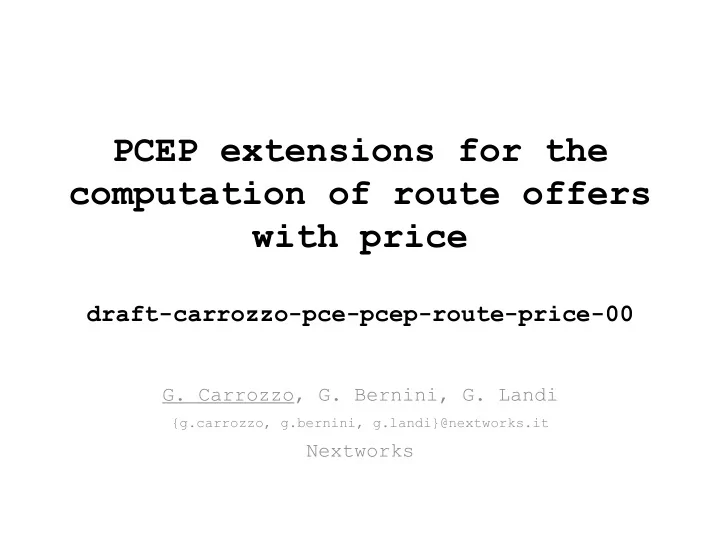

PCEP extensions for the computation of route offers with price draft-carrozzo-pce-pcep-route-price-00 G. Carrozzo, G. Bernini, G. Landi {g.carrozzo, g.bernini, g.landi}@nextworks.it Nextworks
Network Service & Business Plane • NSBP includes all the functions for 1. service specification and offer creation 2. product offers publication 3. e2e offer composition 4. triggering service provisioning ( à std PCE cycle + LSP setup) 5. manage service operation/monitoring ( à OAM) 6. triggering service deletion ( à LSP tear-down)
• route offers can be in Service PCE & NSBP the form of sparse multi-domain EROs + cost + price • route prices computed NSBP according to Product - constraints Catalogue specified by PCC: § end points … § bw … … § other metrics SLA offers § load balancing Controller PCEP + builder § ... - PCE policies (ref. Service RFC5394) PCE PCEP PCEP Child- Child- PCE PCE Domain Domain A Z
Route price vs. route cost Route cost(s)/metric(s) := Traffic Engineering indicators used by the network administrator (carrier) to optimize the usage of its network resources – 1 IGP metric[RFC5440] – 2 TE metric[RFC5440] – 3 Hop Counts[RFC5440] – 4 Aggregate bandwidth consumption[RFC5541] – 5 Load of the most loaded link[RFC5541] – 6 Cumulative IGP cost[RFC5541] – 7 Cumulative TE cost[RFC5541] – 8 P2MP IGP metric[RFC6006] – 9 P2MP TE metric[RFC6006] – 10 P2MP hop count metric[RFC6006] – ... Route price := EUR/$$ refers to the customer-supplier interaction at the business level for offering, negotiating and, eventually, instantiating a network connectivity \ service (e.g. a [G]MPLS LSP) – depends on strategic factors – depends on the ingress/egress interfaces/PoPs – influenced by the amount of mobilized network resources (route)
PCEP RP Object extension 0 1 2 3 0 1 2 3 4 5 6 7 8 9 0 1 2 3 4 5 6 7 8 9 0 1 2 3 4 5 6 7 8 9 0 1 +-+-+-+-+-+-+-+-+-+-+-+-+-+-+-+-+-+-+-+-+-+-+-+-+-+-+-+-+-+-+-+-+ | |P| Flags |O|B|R| Pri | +-+-+-+-+-+-+-+-+-+-+-+-+-+-+-+-+-+-+-+-+-+-+-+-+-+-+-+-+-+-+-+-+ | Request-ID-number | +-+-+-+-+-+-+-+-+-+-+-+-+-+-+-+-+-+-+-+-+-+-+-+-+-+-+-+-+-+-+-+-+ | | // Optional TLVs // | | +-+-+-+-+-+-+-+-+-+-+-+-+-+-+-+-+-+-+-+-+-+-+-+-+-+-+-+-+-+-+-+-+ • 1 bit in RP object ( Price Request bit ) – PCC to set P-bit in case of route offer computation – When P-bit is set, the PCE computes a set of route offers • A PCErr message with Error-Type "Capability not supported“ sent back to PCC if PCE does not support it
PRICE-INFO Object 0 1 2 3 0 1 2 3 4 5 6 7 8 9 0 1 2 3 4 5 6 7 8 9 0 1 2 3 4 5 6 7 8 9 0 1 +-+-+-+-+-+-+-+-+-+-+-+-+-+-+-+-+-+-+-+-+-+-+-+-+-+-+-+-+-+-+-+-+ | priceModel | currencyType | +-+-+-+-+-+-+-+-+-+-+-+-+-+-+-+-+-+-+-+-+-+-+-+-+-+-+-+-+-+-+-+-+ |priceUnitTime |priceUnitData | capUnitTime | capUnitData | +-+-+-+-+-+-+-+-+-+-+-+-+-+-+-+-+-+-+-+-+-+-+-+-+-+-+-+-+-+-+-+-+ | priceValue | +-+-+-+-+-+-+-+-+-+-+-+-+-+-+-+-+-+-+-+-+-+-+-+-+-+-+-+-+-+-+-+-+ | capValue | +-+-+-+-+-+-+-+-+-+-+-+-+-+-+-+-+-+-+-+-+-+-+-+-+-+-+-+-+-+-+-+-+ • priceModel (8 bits): Pay-as-you-go | Flat • currencyType (24 bits): ISO-4217 currency name (e.g. EUR, USD, etc.) • priceUnitTime (8 bits): time interval for a unitary price value (mins | hours| day | week | month | year ) • priceUnitData (8 bits): data volume for a unitary price value (KB|MB|GB|TB) • priceValue (32 bits): value of the price • capUnitTime (8 bits): time unit used to express the Cap Value (same as per priceUnitTime) • capUnitData (8 bits): data volume unit used to express the Cap Value (same as per priceUnitData) • capValue (32 bits): upper bound for this service offer (e.g. max data volume or time length for which the given offer is valid at the specified price)
PRICE-INFO Object • <PCRep Message> ::= <Common Header> For successful route offers computation <response-list> – at least 1 PRICE-INFO object per PCRep msg <response-list>::=<response>[<response-list>] (if P-bit is set in RP) – multiple PRICE-INFO <response>::= <RP> objects when more than [<NO-PATH>] one route offer is [<attribute-list>] identified by the PCE for the same service [<path-list>] – All the PRICE-INFO objects carried in a <path-list>::=<path>[<path-list>] path refer to the same ERO computed by the PCE <path>::= <ERO><attribute-list> • In case of unsuccessful route offers <attribute-list>::= [<price-info-list>] computation [<LSPA>] – NO-PATH object is [<BANDWIDTH>] included as for standard path [<metric-list>] computation procedure [<IRO>] <metric-list>::=<METRIC>[<metric-list>] <price-info-list>::=<PRICE-INFO>[price-info-list]
Next steps • Continue collecting feedbacks – this meeting, the mailing list, etc. – some just received via email • Refine the document – PRICE_INFO field as TLV? • min bits allocated with current format • More overhead with TLVs, but a more flexible / extensible object (e.g. express more caps) – Discuss any framework convergence with • pce-hierarchy-fwk • Service-awareness metrics work (delay, jitter, etc.) • Stateful PCE • Find consensus towards progressing to WG I-D
Recommend
More recommend